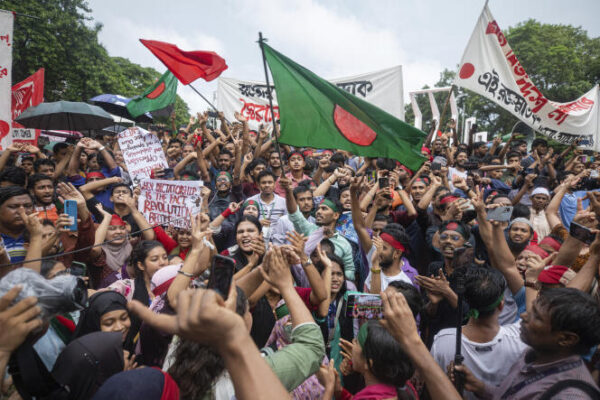In just the last four years 66 Bangladeshi female workers have died in Saudi Arabia. 52 of these women died by committing suicide.
In just the last four years 66 Bangladeshi female workers have died in Saudi Arabia. 52 of these women died by committing suicide.
Only two months after Bangladesh admitted that its female workers are being called back to the country from Saudi Arabia because of the growing reports of physical and sexual abuse coming out of the Gulf kingdom, additional reports are being surfaced of the horrendous abuses and cases of torture being inflicted on the maids and workers who remain trapped inside the country.
Nearly 50,000 women from Bangladesh have gone to work in Saudi Arabia this year, but according to new reports, in just the last four years 66 Bangladeshi female workers have died in Saudi Arabia. 52 of these women died by committing suicide.
Many of these Bangladeshi women who travel to Saudi Arabia for work are lured there under false pretences, promised steady and safe hours, only to find themselves placed with abusive families under a system that provides little to no protection for foreign domestic workers.
Shirina Begum is one such example, explaining to Al Jazeera that she was promised one thing while experiencing another once arriving in the country. Begum stated:
It was a tough job for $235 a month. I needed to work for 14-15 hours straight. It was hard for me to understand their language [Arabic]. I also couldn’t cook to their taste. I didn’t have any access to a phone, so I couldn’t talk to my family back home…They also beat me with a stick sometimes.”
Begum also came forward about how she was sexually abused while with the family, which prompted her to run away and seek refuge. Because she didn’t have the correct immigration papers, due to the fact that Saudi Arabia does not ensure domestic workers the right to hold their own identification, Begum was thrown in jail for four weeks before she was given help by the Bangladesh embassy:
I was sleeping in the kitchen. Suddenly I realised someone was trying to get on the top of me. I screamed loud but he shut my mouth with his hand. Then he molested me. At one point, I applied all my force and he was compelled to leave me….[then once jailed] I was treated like an animal inside the prison…I was able to work for only four months and I got salary of just two months. Now I am in debt as I can’t pay back to my loan sharks.”
This story is only one of many who experience torture, sexual abuse, and psychological trauma while working without any protections inside Saudi Arabia. Many attempt, and sadly many succeed, at suicide because of the harsh conditions. Dalia Akhter is one such woman, who after being sold to different abusive families across Saudi Arabia, attempted to end her life by jumping out of a third-story building. She survived, but the family who she worked for simply dropped her off at the Bangladesh embassy, where she was allowed to return back home:
I had to work from 5am to 10pm every day without a break. The Malkin [her female employer] used to beat me with a stick when I could not understand her instructions. I felt helpless and trapped.”
Most recently, after a video surfaced of Bangladeshi domestic worker Sumi Akter’s desperate pleas to be rescued from her abusive family, protests have erupted across the Bangladeshi capital of Dhaka over the continued abuses in the kingdom. Sumi Akter’s video showed her hiding in a bathroom, showing scars from when her family poured hot oil over her arms. She also details how she was starved, sexually abused, and locked in a dark room for more than two weeks.
According to BRAC, an NGO working with Bangladeshi migration workers, more than 1,353 female domestic workers returned to Bangladesh because of the abuses and inhumane working conditions inside Saudi Arabia. Shariful Islam Hasan, from BRAC, stated:
After they came back, they reported of mental, physical and sexual abuse…I haven’t found a single case where the employers have been punished. So the Saudi employers think they can do whatever they want with these workers without facing any consequences.”
Female workers in Saudi Arabia are subject to highly controversial punishments in addition to being abused on a daily occurrence. These punishments include the ability to be charged for moral crimes by Saudi officials. Being raped by their employers often results in maids and domestic workers being subject to punishment for having sex outside of marriage. Fleeing from their homes can also constitute as a crime, in a country that seemingly has very little in terms of protection for international migrants. Human Rights Watch’s Rothna Begum stated:
I have documented many cases across the Gulf where men have come into the woman’s room and have either tried to rape them or actually raped them. Women have talked about being sold to another employer and not being paid salaries or having their wages delayed. The range of abuses can amount to forced labour or sometimes even slavery where the employer refuses to pay them and says things like ‘I bought you’.”
As Saudi Arabia continues to abuse and deny any form of human rights for its domestic workers, many of the Bangladeshi female workers who feel like they have little choice but to move to Saudi for economic reasons are repeatedly abused. It remains to be seen whether or not Saudi will be fully held to account over what may well be a systematic abuse of human rights within the kingdom.





